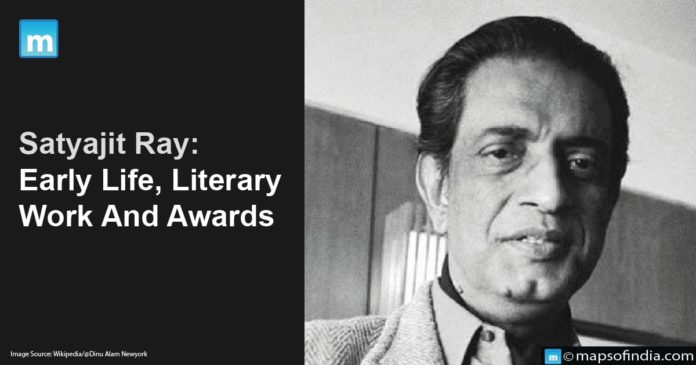“Cinema’s characteristic forte is its ability to capture and communicate the intimacies of the human mind.”
The rusty aisles of Bengal have presented the world with numerous brilliant minds, men, and women who evolved in artistic forms and made a splendid name for themselves out in the world. An artist infused with humanist thought with an explicable love for cinema, Satyajit Ray is a legend in himself, the man cultivated in the roots of Bengal’s Renaissance.
The mention of Bengal or Cinema is only possible by reminiscing the great work of Satyajit Ray and the man himself. Through the humanistic approach of highlighting the film’s content, his unique perspective, style, and eccentricities gave new wheels to the entire world of Indian Cinema. Through his art of emotive narration sliding the motion pictures, his movies spoke to a universal audience despite the vernacular of language in which the films were made.
Early Life
Satyajit Ray, a legendary Indian filmmaker, was born in Kolkata, India, on May 2, 1921. Ray hailed from a prominent intellectual family with his father, Sukumar Ray, a renowned poet and writer. Growing up in an environment steeped in creativity and literature, Ray developed a keen interest in the arts from an early age. Ray received his education at Ballygunge Government High School and later pursued a degree in economics from Presidency College in Kolkata. Although initially aspired to become a commercial artist, his passion for cinema led him to explore the medium further. Ray’s exposure to international cinema, particularly the works of directors like Vittorio De Sica and Jean Renoir, deeply influenced his artistic sensibilities.
During his early years, Ray also worked as a visualizer and illustrator for advertising agencies, honing his skills in visual storytelling. These experiences and his innate artistic talents laid the foundation for his future achievements as a filmmaker. Satyajit Ray’s formative years were characterized by a stimulating environment that nurtured his artistic inclinations and set the stage for his groundbreaking contributions to Indian cinema.
Literary Works
Satyajit Ray debuted in the direction industry of Bengali cinema through his legendary film Pather Panchali. A film that etched an immortal mark in the history of cinema and our hearts and that went on to be glorified as one of the classics of neorealist cinema. Capturing the mundane and serene quintessential of life through the eyes of young child protagonist Apu in an imaginatively coordinated and moving manner, the film spoke to the audience in the warmest ways. Detective Feluda and Professor Shanku are other landmark contributions of Satyajit Ray to Bengali Literature. His first movie was part of the Apu Trilogy, with Aparajito and Apur Sansar being the sequels in the same. The entire trilogy was highly applauded and received ravishing remarks from film industry critics.
His exceptional contribution to the cinema was honored with numerous well-deserving accolades. His notable awards include the prestigious Academy Honorary Award (1992) for his lifetime achievements, the Golden Lion at the Venice Film Festival (1957) for his masterpiece “Aparajito,” and the Golden Bear at the Berlin International Film Festival (1956) for “Pather Panchali.” Ray’s films also garnered critical acclaim, winning numerous National Film Awards in India. His legacy as a visionary filmmaker continues to inspire generations of artists worldwide. Satyajit Ray has made a never-dying impression on the cosmo of art and creativity. The man who penned profanity through his thoughts showed the world his eclectic art of cinema, an artist, a director, a revolutionary, and, more importantly, a humanist.





